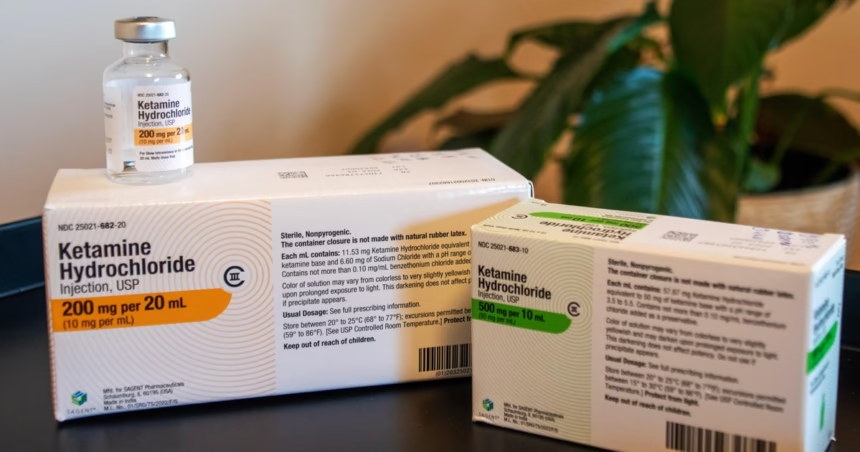If you or someone you know may be experiencing a mental health crisis, contact the 988 Suicide & Crisis Lifeline by dialing or texting “988.”
Asheville, North Carolina — A few months ago, Waynesville Police Sgt. Paige Shell was about to give up hope of getting better. The daily drip of violence, death, and misery from almost 20 years in law enforcement had left a mark. Her sleep was poor, depression was a stubborn companion, and thoughts of suicide had taken root.
Shell, who works in a rural community about 30 miles west of Asheville, tried talk therapy, but it didn’t work. When her counselor suggested ketamine-assisted psychotherapy, she was skeptical.
“I didn’t know what to expect. I’m a cop. It’s a trust thing,” she said with a thin smile.
Combining psychotherapy with low-dose ketamine, a hallucinogenic drug long used as an anesthetic, is a relatively new approach to treating severe depression and post-traumatic stress, especially in populations with high trauma rates such as firefighters, police officers, and military members. Yet evidence of the efficacy and safety of ketamine for treatment of mental health conditions is still evolving, and the market remains widely unregulated.
“First responders experience a disproportionately high burden of trauma and are often left without a lot of treatment options,” said Signi Goldman, a psychiatrist and co-owner of Concierge Medicine and Psychiatry in Asheville, who began including ketamine in psychotherapy sessions in 2017.
Law enforcement officers in the U.S., on average, are exposed to 189 traumatic events over their careers, a small study suggests, compared with two to three in an average adult’s lifetime. Research shows that rates of depression and burnout are significantly higher among police officers than in the civilian population. And in recent years, more officers have died by suicide than been killed in the line of duty, according to the first-responder advocacy group First H.E.L.P.
Ketamine is a dissociative drug, meaning it causes people to feel detached from their body, physical environment, thoughts, or emotions.
The Food and Drug Administration approved it as an anesthetic in 1970. It became a popular party drug in the 1990s, and in 1999, ketamine was added to the list of Schedule III nonnarcotic substances under the Controlled Substances Act.
The death of “Friends” actor Matthew Perry in 2023, which was attributed to ketamine use, further tainted the drug’s reputation.
But starting with a 1990 animal study and followed by a landmark human trial, research has shown that low doses of ketamine can also rapidly reduce symptoms of depression. In 2019, the FDA approved esketamine — derived from ketamine and administered as a nasal spray — for treatment-resistant depression.
All other forms of ketamine remain FDA-approved only for anesthesia. If used to treat psychiatric disorders, it must be prescribed off-label.
“This is a situation where the clinical practice is probably ahead of the evidence to support it,” said John Krystal, chair of the Department of Psychiatry at the Yale School of Medicine and a pioneer of ketamine research.
Krystal has studied the effect of ketamine on veterans and active-duty military members — a population comparable to first responders in their exposure to trauma. While research shows strong evidence of ketamine’s antidepressant effects, he said further studies are needed on its potential role in PTSD treatment.
The regulatory environment for ketamine also remains a concern, Krystal said. State oversight varies, and federal regulations don’t outline dosing, administration methods, safety protocols, or training for providers.
In this regulatory patchwork, more than 1,000 ketamine clinics have sprung up across the country. At-home ketamine treatments have flooded the market, prompting the FDA to issue a warning.
Side effects of ketamine can range from nausea and blood pressure spikes to suppressed breathing. The drug can also cause adverse psychological effects.
“Being on a psychedelic puts people in an extremely vulnerable state,” Goldman said. People can get retraumatized as they relive disturbing memories. That’s why it’s critical that a mental health provider guide a person through a ketamine session, she said.
With proper precautions — and when other treatments have failed — Rick Baker thinks ketamine-assisted psychotherapy is a good fit for first responders. Baker is CEO and founder of Responder Support Services, which provides mental health treatment exclusively to police officers, firefighters, and other first responders in North Carolina, South Carolina, and Tennessee.
As a population, first responders are more resistant than civilians to traditional therapy, said Baker, who is a licensed clinical mental health counselor. Ketamine provides a potential shortcut into the trauma memory and works “like an accelerant to psychotherapy,” he said. “It strips away people’s armor.”
When used for mental health treatment, a dose of ketamine — typically half a milligram per kilogram of body weight, less than for anesthesia — creates a mildly altered state of consciousness, Goldman said. It makes people look at their own traumatic memories at a distance “and tolerate them differently,” she said.
The ketamine sessions in her practice are usually two hours long, and clients are under the drug for about 45 minutes. The drug is administered as an IV drip, an intramuscular injection, under-the-tongue lozenges, or a compounded nasal spray. The drug is short-acting, meaning its dissociative effects largely wear off within about an hour.
But most insurers won’t pick up the cost of ketamine-assisted psychotherapy, which can be more than $1,000 per session for the IV drip.
“That’s certainly prohibitive for first responders,” Goldman said.
The Department of Veterans Affairs covers some forms of ketamine treatment, including ketamine-assisted psychotherapy, for eligible veterans on a case-by-case basis.
In Shell’s case, a donation made to Responder Support Services covered what her insurance wouldn’t when she decided this spring to try ketamine-assisted psychotherapy with Baker, her counselor.
Revisiting the most gruesome calls in her nearly two decades as a police officer was not something Shell wanted to do. But Hurricane Helene, which caused catastrophic flooding in western North Carolina last year, pushed the 41-year-old “over the edge,” she said.
“Some of the sessions were rough,” said Shell, who is also a member of her agency’s SWAT team. “Things came up that I didn’t want to think about, that I’d buried during my entire career.”
The badly mangled victim in a fatal car crash. A murder-suicide, in which a man cut his pregnant girlfriend’s throat then slit his own.
Under ketamine, the images came to life as still pictures, she said, like a surreal slideshow replaying some of her darkest memories. “Then I would sit there and cry like a baby.”
As of early October, Shell had undergone 12 ketamine sessions. They have not provided a sudden miraculous cure, she said. But her sleep has improved, and bad days are now bad moments. She also finds it easier to manage stress. “And I smile more than I used to,” she said.
She was hesitant to share her experience within her department because of the ongoing stigma associated with seeking help in the hard-charging police culture.
“I just didn’t want my people to think that I couldn’t handle the job,” she said. “I didn’t want them to feel that I’m posing a risk to them.”
The perception of ketamine plays a role as well, said Sherri Martin, national director of wellness services at the Fraternal Order of Police, an organization representing more than 377,000 sworn law enforcement officers. Many cops are used to ketamine as an illegal street drug, she said, or think of it as a counterculture psychedelic.
“So, when they are supposed to accept this as a treatment, that’s hard for them to grasp,” she said.
Few if any police departments provide clear guidance on ketamine-assisted psychotherapy. If it were medically prescribed, it would likely be viewed the same as taking an antidepressant, Martin said.
Shell ultimately shared her story with colleagues, most of whom were curious and supportive, and she now encourages other officers to speak up about their struggles. She believes seeking mental health treatment — in her case, ketamine-assisted psychotherapy — has made her a better and safer police officer.
“It’s hard to help other people when you can’t take care of yourself,” she said.
KFF Health News is a national newsroom that produces in-depth journalism about health issues and is one of the core operating programs at KFF — the independent source for health policy research, polling, and journalism.









